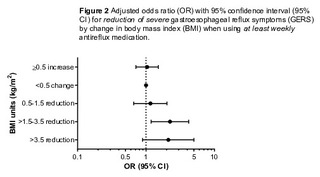Weight Loss and Reduction in Gastroesophageal Reflux. A Prospective Population-Based Cohort Study: The HUNT Study
Abstract
OBJECTIVES:High body mass index (BMI) is an established risk factor of gastroesophageal reflux symptoms (GERS). The aim of this study was to clarify if weight loss reduces GERS.METHODS:The study was part of the Nord-Trondelag health study (the HUNT study), a prospective population-based cohort study conducted in Nord-Trondelag County, Norway. All residents of the county from 20 years of age were invited. In 1995-1997 (HUNT 2) and 2006-2009 (HUNT 3), 58,869 and 44,997 individuals, respectively, responded to a questionnaire on heartburn and acid regurgitation. Among these, 29,610 individuals (61% response rate) participated at both times and were included in the present study. The association between weight loss and reduction of GERS was calculated using logistic regression. The analyses were stratified by antireflux medication and the results adjusted for sex, age, cigarette smoking, alcohol consumption, education, and physical exercise.RESULTS:Weight loss was dose-dependently associated with a reduction of GERS and an increased treatment success with antireflux medication. Among individuals with >3.5 units decrease in BMI, the adjusted odds ratio (OR) of loss of any (minor or severe) GERS was 1.98 (95% confidence interval (CI) 1.45-2.72) when using no or less than weekly antireflux medication, and 3.95 (95% CI 2.03-7.65) when using at least weekly antireflux medication. The corresponding ORs of loss of severe GERS was 0.90 (95% CI 0.32-2.55) and 3.11 (95% CI 1.13-8.58).CONCLUSIONS:Weight loss was dose-dependently associated with both a reduction of GERS and an increased treatment success with antireflux medication in the general population.
